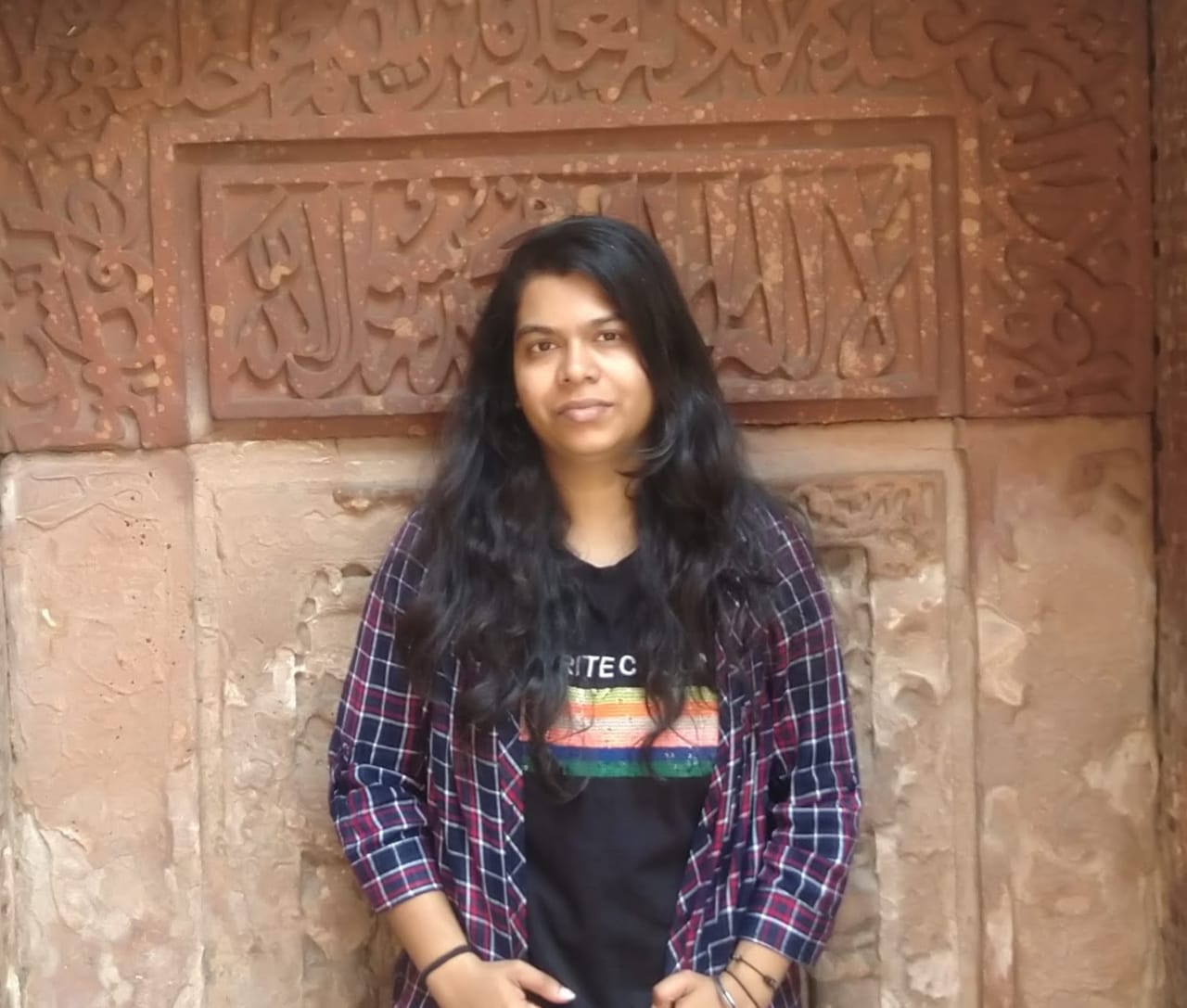Moplah genocide: When Dr. Ambedkar exposed the hypocrisy of Gandhi's non-violence stance
Looking at Gandhi"s approach toward achieving his Hindu-Muslim unity, Ambedkar said, ""Can any sane man go so far, for the sake of Hindu-Muslim unity? But Mr Gandhi was so attached to Hindu-Muslim unity that he did not stop to enquire what he was doing in this mad endeavour.
Total Views |
Intellectual historians and politicians, particularly grand old party leaders, have always attempted to whitewash "real Indian history" by concealing true facts or presenting half-truths. Thanks to them, we have always been taught how Mughal kings like "Akbar protected Hindus" and "how Mahatma Gandhi" used his ideals of truth and non-violence as his tools to lead India's freedom struggle against British colonial rule.
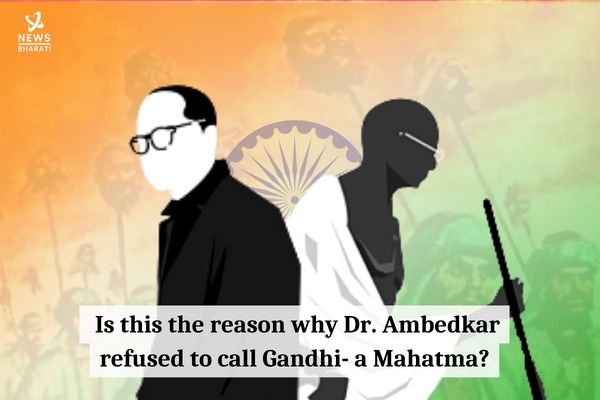
Dr Babasaheb Ambedkar, the father of the Indian constitution, who had previously refused to call Gandhi, a Mahatma, "the father of the nation," had exposed Gandhi's duplicity several times. Many people don't know that Babasaheb Ambedkar, who is well aware of Gandhi's hypocrisy, has always left no stone unturned in criticising Gandhi.
Through his book, 'Pakistan or Partition of India', Ambedkar shed light on how Gandhi's so-called dream of 'Hindu-Muslim unity' led to Hindu genocide in the southern part of the country. Yes, we are talking about the forgotten chapter of history, the Moplah genocide of Malabar Hindus. According to Ambedkar, the genocide in Moplah was nothing more than Jihad. However, as per Gandhi and communist historians, it was the Moplah rebellion, that was part of the Indian freedom struggle. Historians have often been told that the Khilafat movement was one where Hindus and Muslims fought together to oust the British.
Let's know the truth about the Malabar Hindu Genocide.
In Ambedkar's words, Gandhi not only agreed with the Muslims in the Khilafat cause, but he also acted as their guide and their friend. In his book, Ambedkar revealed that Swaraj was not at all the primary object of the movement, but that its primary objective was to convert 'Dar-ul-Harab' into 'Dar-al-Islam' (to form the Islamic Kingdom overthrowing British rule) in a bid to support the Sultan as Caliph of Islam following the breakup of the Ottoman Empire at the end of the war and that Swaraj was added a secondary object to induce the Hindus to join the moment.(Pakistan or Partition of India, pages 137,138).
Ambedkar says: "The (Khilafat) movement was started by the Mohammedans. It was taken up by Mr Gandhi with tenacity and faith, which might have surprised many Mohammedans themselves. Many people doubted the ethical basis of the Khilafat movement and tried to dissuade Gandhi from taking any part in the movement, the ethical basis of which was so questionable." (Pakistan or Partition of India, pages 146,147).
As per Ambedkar, Gandhi was supporting Maulana at this moment (which later turned into the Moplah genocide), just to achieve his so-called dream of "Hindu-Muslim unity." Talking about it, Ambedkar said, "On the contrary, his misguided zeal for Swaraj and his obsession with Hindu-Muslim unity, as the only means of achieving it, led him to support the project. " (Pakistan or Partition of India, pages 144,145)
Looking at Gandhi's approach toward achieving his Hindu-Muslim unity, Ambedkar said, "'Can any sane man go so far, for the sake of Hindu-Muslim unity? But Mr Gandhi was so attached to Hindu-Muslim unity that he did not stop to enquire what he was doing in this mad endeavour. So anxious was Mr Gandhi in laying the. foundations of Hindu-Muslim unity well and truly, that did not forget to advise his followers regarding the national crisis." (Pakistan or Partition of India, pages 144)
Gandhi, who daydreamed that his support for the Khilafat movement would solidify the anti-British sentiment amongst Indian Muslims, had resulted in the brutal murder of over 10,000 Hindus, the rape of thousands of Hindu women, and the desecration of temples that Hindus held sacred.
Talking about the genocide, Ambedkar wrote, "The aim was to establish the kingdom of Islam by overthrowing the British Government. Knives, swords and spears were secretly manufactured, and bands of desperadoes were collected for an attack on British authority. On 20th August a severe encounter took place between the Moplahs and the British forces at Pinmangadi. Roads were blocked, telegraph lines cut, and the railway destroyed in a number of places. As soon as the administration had been paralysed, the Moplahs declared that Swaraj had been established. A certain Ali Mudaliar was proclaimed Raja, Khilafat flags were flown, and Ernad and Walluvanade were declared Khilafat Kingdoms. As a rebellion against the British Government, it was quite understandable. But what baffled most was the treatment accorded by the Moplahs to the Hindus of Malabar. The Hindus were visited by a dire fate at the hands of the Moplahs. Massacres, forcible conversions, desecration of temples, foul outrages upon women, such as ripping open pregnant women, pillage, arson and destruction – in short, all the accompaniments of brutal and unrestrained barbarism, were perpetrated freely by the Moplahs upon the Hindus until such time as troops could be hurried to the task of restoring order through a difficult and extensive tract of the country. This was not a Hindu-Moslem riot. This was just Bartholomew." (Pakistan or Partition of India, pages 153)
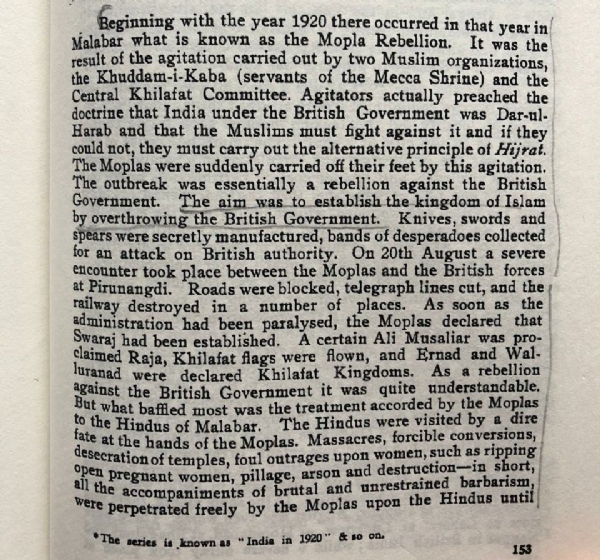
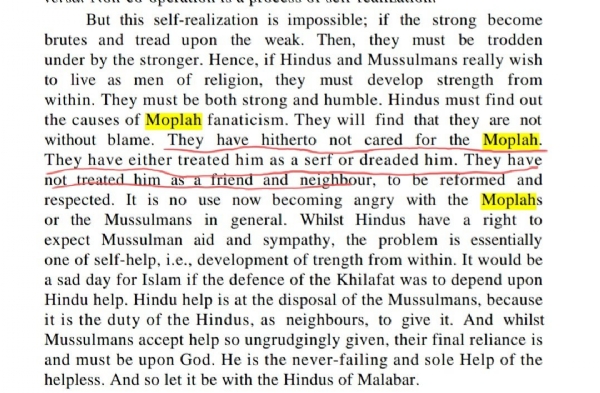

As per Gandhi, "Hindus should not harbour anger in their hearts against Muslims even if the latter wanted to destroy them. Even if the Muslims want to kill us all we should face death bravely. If they established their rule after killing Hindus we would be ushering in a new world by sacrificing our lives. None should fear death. Birth and death are inevitable for every human being. Why should we then rejoice or grieve? If we die with a smile we shall enter into a new life, we shall be ushering in a new India."
Ambedkar was incensed at Gandhi’s selectivity, more so at his stand on the Moplah Massacre. "Mr Gandhi has never called the Muslims to account even when they have been guilty of gross crimes against Hindus," said Ambedkar. (Pakistan or Partition of India, pages 146)

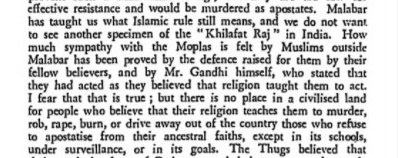
He also pointed out that after the genocide, Congress carefully tried to hide the atrocities to please the Muslims. The resolution passed by the Working Committee of Congress completely twisted the details of the Mopla atrocities against Hindus. It mentioned only three forcible conversions. To quote from BR Ambedkar's book, In reply to a question in the Central Legislature (Debates 16th January 1922) Sir William Vincent Madras Government reported that the number of forcible conversions probably run to thousands but that for obvious reasons it will never be possible to anything like an accurate estimate". (Pakistan or Partition of India, pages 148)
However, the reality is much different than what we have been taught. We all know that Akbar never protected Hindus, but do we know that Mohandas Karamchand Gandhi, whom we all know as a peace-loving man, had supported violence and even later justified it? Yes, what you read is true.
Dr Babasaheb Ambedkar, the father of the Indian constitution, who had previously refused to call Gandhi, a Mahatma, "the father of the nation," had exposed Gandhi's duplicity several times. Many people don't know that Babasaheb Ambedkar, who is well aware of Gandhi's hypocrisy, has always left no stone unturned in criticising Gandhi.
Through his book, 'Pakistan or Partition of India', Ambedkar shed light on how Gandhi's so-called dream of 'Hindu-Muslim unity' led to Hindu genocide in the southern part of the country. Yes, we are talking about the forgotten chapter of history, the Moplah genocide of Malabar Hindus. According to Ambedkar, the genocide in Moplah was nothing more than Jihad. However, as per Gandhi and communist historians, it was the Moplah rebellion, that was part of the Indian freedom struggle. Historians have often been told that the Khilafat movement was one where Hindus and Muslims fought together to oust the British.
Let's know the truth about the Malabar Hindu Genocide.
Unreservedly, the Moplah genocide is the result of the Khilafat movement - a campaign that was started by the Ali brothers, more specifically Mohammed Ali, who was the founder of the All Muslim League, which was directly responsible for partition, and was supported by Mahatma himself just to please his friend, Maulana Hasrat Mohani. Gandhi not only extended unquestioning support to the Khilafat movement by the Malabar Muslims, but he also asked Hindus to support the movement by saying it was done as a means of winning Swaraj.
In Ambedkar's words, Gandhi not only agreed with the Muslims in the Khilafat cause, but he also acted as their guide and their friend. In his book, Ambedkar revealed that Swaraj was not at all the primary object of the movement, but that its primary objective was to convert 'Dar-ul-Harab' into 'Dar-al-Islam' (to form the Islamic Kingdom overthrowing British rule) in a bid to support the Sultan as Caliph of Islam following the breakup of the Ottoman Empire at the end of the war and that Swaraj was added a secondary object to induce the Hindus to join the moment.(Pakistan or Partition of India, pages 137,138).
Ambedkar says: "The (Khilafat) movement was started by the Mohammedans. It was taken up by Mr Gandhi with tenacity and faith, which might have surprised many Mohammedans themselves. Many people doubted the ethical basis of the Khilafat movement and tried to dissuade Gandhi from taking any part in the movement, the ethical basis of which was so questionable." (Pakistan or Partition of India, pages 146,147).
As per Ambedkar, Gandhi was supporting Maulana at this moment (which later turned into the Moplah genocide), just to achieve his so-called dream of "Hindu-Muslim unity." Talking about it, Ambedkar said, "On the contrary, his misguided zeal for Swaraj and his obsession with Hindu-Muslim unity, as the only means of achieving it, led him to support the project. " (Pakistan or Partition of India, pages 144,145)
Looking at Gandhi's approach toward achieving his Hindu-Muslim unity, Ambedkar said, "'Can any sane man go so far, for the sake of Hindu-Muslim unity? But Mr Gandhi was so attached to Hindu-Muslim unity that he did not stop to enquire what he was doing in this mad endeavour. So anxious was Mr Gandhi in laying the. foundations of Hindu-Muslim unity well and truly, that did not forget to advise his followers regarding the national crisis." (Pakistan or Partition of India, pages 144)
Gandhi, who daydreamed that his support for the Khilafat movement would solidify the anti-British sentiment amongst Indian Muslims, had resulted in the brutal murder of over 10,000 Hindus, the rape of thousands of Hindu women, and the desecration of temples that Hindus held sacred.
Talking about the genocide, Ambedkar wrote, "The aim was to establish the kingdom of Islam by overthrowing the British Government. Knives, swords and spears were secretly manufactured, and bands of desperadoes were collected for an attack on British authority. On 20th August a severe encounter took place between the Moplahs and the British forces at Pinmangadi. Roads were blocked, telegraph lines cut, and the railway destroyed in a number of places. As soon as the administration had been paralysed, the Moplahs declared that Swaraj had been established. A certain Ali Mudaliar was proclaimed Raja, Khilafat flags were flown, and Ernad and Walluvanade were declared Khilafat Kingdoms. As a rebellion against the British Government, it was quite understandable. But what baffled most was the treatment accorded by the Moplahs to the Hindus of Malabar. The Hindus were visited by a dire fate at the hands of the Moplahs. Massacres, forcible conversions, desecration of temples, foul outrages upon women, such as ripping open pregnant women, pillage, arson and destruction – in short, all the accompaniments of brutal and unrestrained barbarism, were perpetrated freely by the Moplahs upon the Hindus until such time as troops could be hurried to the task of restoring order through a difficult and extensive tract of the country. This was not a Hindu-Moslem riot. This was just Bartholomew." (Pakistan or Partition of India, pages 153)
To the horror of Ambedkar, Gandhi even justified the genocide and blamed the Hindus for it. Gandhi had said that "must find out the causes of Moplah fanaticism. They will find that they are not without blame. They have hitherto not cared for the Moplah. They have either treated him as a serf or dreaded him. They(Hindus) have not treated him as a friend and neighbour, to be reformed and respected. It is no use now becoming angry with the Moplahs or the Muslims in general."
More shockingly, Gandhi went further and also supported Maulana Hasrat Mohani, who defended the rioters, saying, "Maulana Hasrat Mohani is one of our most courageous men. He is strong and unbending. He is frank to a fault. In his insensate hatred of the English Government and possibly even of Englishmen in general, he has seen nothing wrong in anything that the Moplahs have done. Everything is fair in love and war with the Maulana. He has made up his mind that the Moplahs have fought for their religion. And that fact (in his estimation) practically absolves the Moplahs from all blame.....I advise my Malabar friends not to mind the Maulana. Despite his amazingly crude views about religion, there is no greater nationalist nor a greater lover of Hindu-Muslim unity than the Maulana. His heart is sound and superior to his intellect, which, in my humble opinion, has suffered aberration."
As per Gandhi, "Hindus should not harbour anger in their hearts against Muslims even if the latter wanted to destroy them. Even if the Muslims want to kill us all we should face death bravely. If they established their rule after killing Hindus we would be ushering in a new world by sacrificing our lives. None should fear death. Birth and death are inevitable for every human being. Why should we then rejoice or grieve? If we die with a smile we shall enter into a new life, we shall be ushering in a new India."
Ambedkar was incensed at Gandhi’s selectivity, more so at his stand on the Moplah Massacre. "Mr Gandhi has never called the Muslims to account even when they have been guilty of gross crimes against Hindus," said Ambedkar. (Pakistan or Partition of India, pages 146)
He said, "Mr Gandhi has never protested against such murders. Not only have the Muslims not condemned these outrages but even Mr Gandhi has never called upon the leading Muslims to condemn them. He has kept silent over them. Such an attitude can be explained only on the ground that Mr Gandhi was anxious to preserve Hindu-Moslem unity and did not mind the murders of a few Hindus if it could be achieved by sacrificing their lives." (Pakistan or Partition of India, pages 147)
Ambedkar further continued, "Malabar has taught us what Islamic rule still means, and we do not want to see another specimen of the Khilafat Raj in India. How much sympathy for the Moplas is felt by Muslims outside Malabar has been proved by the defence raised for them by their fellow believers, and by Mr Gandhi himself, who stated that they had acted as they believed that religion taught them to act. I fear that that is true; but there is no place in a civilised land for people who believe that their religion teaches them to murder, rob, rape, burn, or drive away out of the country those who refuse to apostatise from their ancestral faiths, except in its schools, under surveillance, or in its goals."

He further attacked Gandhi saying the Malabar genocide was too heavy a price for Hindu-Moslem unity. "All over Southern India, a wave of horrified feeling had spread among the Hindus of every shade of opinion, which was intensified when certain Khilafat leaders were so misguided as to pass resolutions of ‘congratulations to the Moplahs on the brave fight they were conducting for the sake of religion’. Any person could have said that this was too heavy a price for Hindu-Moslem unity. But Mr Gandhi was so obsessed with the necessity of establishing Hindu-Moslem unity that he was prepared to make light of the doings of the Moplahs and the Khilafats who were congratulating them. He spoke of the Moplahs as the ‘brave God-fearing Moplahs who were fighting for what they consider as religion and in a manner which they consider as religious," he said. (Pakistan or Partition of India, pages 147, 148)
After learning this part of history from Dr Babasaheb Ambedkar's views on Mahatma Gandhi, the first question that comes to mind is, why did communist historians and intellectuals hide the real face of Gandhi's hypocrisy over Moplah Genocide? Why Gandhi is still being called a 'non-violent' person when he did only supported the Hindu genocide and justified it, as well? Is this the reason why Dr. Ambedkar refused to call Gandhi- a Mahatma?
